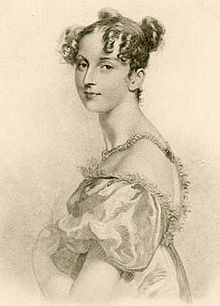Dorothea von Lieven
| Dorothea Lieven | |
|---|---|

Princess von Lieven line engraving by William Bromley, after a drawing by Sir Thomas Lawrence, published 1825; original in the Hermitage Museum
|
|
| Born |
17 December 1785 Rīga, Governorate of Livonia, Russian Empire |
| Died | 27 January 1857 (aged 71) Paris, France |
| Spouse | Christopher Lieven |
| Father | Christopher von Benckendorff |
| Mother | Juilane Schilling von Canstatt |
Princess Dorothea von Lieven (Russian: Дарья Христофоровна Ливен, Daria Khristoforovna Liven), née Benckendorff (17 December 1785 – 27 January 1857) was a Baltic German noblewoman and wife of Prince Khristofor Andreyevich Lieven, Russian ambassador to London, 1812 to 1834. She was also an influential figure among many of the diplomatic, political, and social circles of 19th-century Europe.
Dorothea von Benckendorff was born into Russia's distinctive Baltic nobility to a Baltic German family in Riga in today's Latvia, daughter of General Baron Christoph von Benckendorff (Friedrichsham, 12 January 1749 - 10 June 1823), who served as the military governor of Livonia, and wife Baroness Anna Juliane Charlotte Schilling von Canstatt (Thalheim, 31 July 1744 - 11 March 1797), who held a high position at the Romanov Court as senior lady-in-waiting and best friend of Empress Maria Fyodorovna, and paternal granddaughter of Johann Michael von Benckendorff and wife Sophie von Löwenstern.
Dorothea was the sister of the Russian generals Alexander and Konstantin von Benckendorff. Her other sister Maria von Benckendorff (Saint Petersburg, 1784 - ?) married Ivan Georgievich Sevitsch.
Educated at St. Petersburg's exclusive Smolny Convent Institute, von Lieven was assigned as a maid of honour to Maria Fyodorovna. In St. Petersburg on 1 February 1800, at age fourteen, some months after finishing her studies, von Lieven married General Count (later Prince) Christopher Lieven. Although the marriage was arranged, the couple managed to live in harmony for many years; only in the last years did serious differences arise between the couple, leading to a total estrangement. They had one daughter and five sons, three of whom predeceased their mother: Magda, Paul (24 February 1805 - 1866), Alexander (9 March 1806 - 5 October 1885), Konstantin (1807 - 1838), Georg and Arthur.
...
Wikipedia
